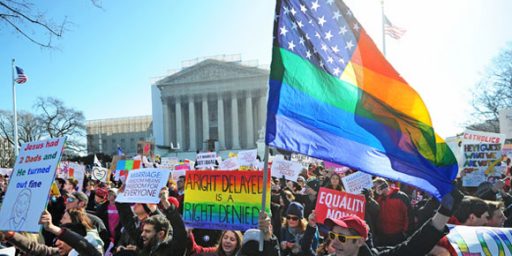Understanding Public Opinion Poll Results
How can opinion shift quickly on a given topic?
 A few days ago, Jonathan Bernstein had a piece at WaPo Explaining the sudden shift on gay marriage among African Americans. The piece makes a key point that needs to be repeated over and over regarding public opinion, and therefore is key to interpreting polling results:
A few days ago, Jonathan Bernstein had a piece at WaPo Explaining the sudden shift on gay marriage among African Americans. The piece makes a key point that needs to be repeated over and over regarding public opinion, and therefore is key to interpreting polling results:
The key is something that political junkies often find difficult to believe: most people don’t really care very much either way about most political issues, including such hot-button issues as marriage, or abortion, or gun control, or any of the other things that many activists feel so passionately about.
[…]
I’d put it this way: Most of us have no strong opinions about many issues. If someone interrupts us with a phone call and asks about one of those issues, we’ll try to figure out what our “team” says about it — in which “team” is simply some group we belong to that has high salience to us with respect to politics or, better, to the question being asked. In doing so, we’re apt to remember the last high-profile position taken we’ve heard.
The context here is the shift in public opinion by African-Americans over the question of gay marriage, which has shifted substantially in a short period of time (see here for some numbers).
Here’s the deal, and I refer back to the above quote: “most people don’t really care very much either way about most political issues.” This is hard for people who constantly consume news and read political blogs to understand. If you are reading this now, for example, you probably have had a pretty good idea how you will cast your vote in November for months, if not years. You are are someone who has a hard time understanding how people can ever be “undecided’ on the day of an election (or, probably, at any time). You have firm opinions on, well, almost everything. All of this, I hate to tell you, makes you weird (or, at least, not normal in the statistical sense).
Most people do not spend a lot of time thinking about politics. Most people are apathetic, if not hostile, to politics. And they do not have, in many cases, hardened positions. This makes it easier for opinion to shift, sometime dramatically, when that issue gains a substantial amount of attention. (It also can mean that they can shift back–that is to say that lack of hardened opinions can be volatile).
At a minimum this kind of thing should inform us about how we should interpret polling results. Remember: most people are not political junkies.






I’m a bit jealous of them.
@michael reynolds: There are times when I am as well 😉
African-Americans are in most polls a really small subgroup which gives the group a very big margin of error.
The Pew poll has 1,003 respondents of which only 97 are African Americans.
Good thing is that they actually write the margin of error for the subgroups (lots of pollster don’t), and in the case of the African American subgroup it is 11.6 points.
68% of them say that the announcement didn’t alter their view of Obama, but this could, with a 95% certainty, be anything from 56.4% to 79.6%.
The 16% in the survey who said that it made them see Obama more favorably could be as low as 4.4% or as high as 27.6%.
The 13% in the survey who said that it made them see Obama less favorably could be as low as 1.4% or as high as 24.6%.
So, the only thing I’d be willing to say looking at that subgroup would be that with a 95% certainty, a majority of African Americans didn’t change their view of Obama.
Nothing else.
Yeah, but they should be.
@Steven L. Taylor: Is it better or worse to be an economics geek than a political junkie?
@Ben Wolf: Planets in the same solar system, my friend.
@michael reynolds:
I’ve long wished that I could convince myself that it truly doesn’t matter who becomes president or controls Congress so I could stop paying attention to this stuff.
@KariQ: I don’t pay attention to this stuff because I think that who becomes President or controls Congress matters (it probably does, but the system is already as rigged as the WWE–any people who might really change the status quo to any great degree are excluded). I follow this stuff for comic relief (and to read Michael R’s additions to the threads) and because I need daily practice at various “just for today” exercises.
Right now, I am hoping for a big Republican win in November so that we can enact Ryan’s plan, throw the country back into recession, and get rid of this nonsense that has been going on for the past 4 years (and maybe seriously damage the GOP and conservatism in the process). But, I doubt that I will get my wish. See how it works?